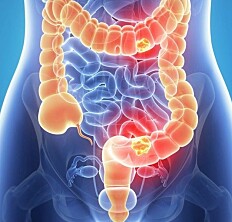
Here’s how you can reduce the risk of colorectal cancer
“Even if you are middle-aged, you still have time to change your lifestyle and improve it,” says Edoardo Botteri from the Cancer Registry of Norway.
A European study suggests that starting with a healthier lifestyle in adulthood reduces the risk of colorectal cancer. The study is the largest of its kind.
Norway has one of the world's highest incidence of colorectal cancer, for reasons that remain unknown.
But researchers agree on one thing: Lifestyle is strongly linked to the risk of getting this form of cancer.
However, there has been a lack of evidence as to whether shifting away from unhealthy habits in adulthood can lower the risk, Edoardo Botteri, a researcher at the Cancer Registry of Norway, said to sciencenorway.no.
He was one of the researchers involved in the new study, which has been published in the American Journal of Gastroenterology. The research results were first reported in Dagens Medisin, a Norwegian online news site for medical professionals.
Smoking and little exercise
“We know that bad habits, such as smoking, drinking moderately to a lot of alcohol, and not being very active have a big effect on the risk of getting colorectal cancer,” Botteri said.
Nevertheless, there’s no solid scientific foundation for recommendations that people make lifestyle changes to reduce their colorectal cancer risk, he said.

“These recommendations are a speculative, based on the research that says that bad habits increase the chance of colorectal cancer,” he said.
The new study addresses this shortcoming.
When you are in your 60s, it can be easy to think that it’s too late to change your lifestyle, Botteri said. But the new study suggests it pays to make the effort.
Responded to two surveys
The researchers used data from a large study called the European Prospective Investigation into Cancer and Nutrition (EPIC).
The data set has previously been used in several studies where researchers have examined the link between lifestyle and cancer.
This time, researchers selected participants who had answered two surveys that dealt with several lifestyle factors.
This resulted in a subset of almost 300,000 Europeans, including roughly 23,000 Norwegian women. The participants were between 35 and 70 years old.
Created a health scale
The two surveys were conducted roughly six years apart.
The researchers were thus able to investigate whether changes in respondents’ lifestyles between the first and second surveys had something to say about colorectal cancer risk.
The questionnaire included questions about four lifestyle factors: alcohol consumption, smoking status, BMI and physical activity.
The researchers created a health index based on the four factors. The participants received a score between 0 and 16, where a higher sum meant a healthier lifestyle.
Each factor, such as smoking or alcohol use, gave a score between 0 and 4. Therefore, the highest score was 16.
Small changes had an effect
A total of 2,799 participants developed colorectal cancer within eight years after the second survey was completed.
The researchers found that just improving lifestyle by one point between the first and second surveys had an effect on colorectal cancer risk.
Each point participants climbed up on the index corresponded to a reduction in colorectal cancer risk of three per cent.
“One point was not much. That corresponded to drinking a little less alcohol or increasing physical activity somewhat,” Botteri said.
Reduced risk
In another analysis, the researchers divided the group of 300,000 into three: those who had a poor lifestyle, those who had an average lifestyle and those who had a good lifestyle.
Those who started well, but whose lifestyle worsened a great deal had a 34 per cent greater risk of getting colorectal cancer afterwards. This is in comparison to participants who maintained a healthy lifestyle.
It is worth mentioning that the risk of getting colorectal cancer is not very high in the first place. The fact that people had a 34 per cent greater risk does not mean that one in three of the group got colorectal cancer. But they had a higher risk compared to people who maintained a healthy lifestyle.
On the other hand, those who started in the least healthy group, but ended up in the healthiest group by the second survey, had a 23 per cent lower risk of colorectal cancer.
This was compared to people who maintained their unhealthy habits.
The researchers saw that those who were healthiest from the start and remained so had the lowest risk of colorectal cancer. However, it helped people to improve their lifestyle.
The study has its limitations
Botteri points out that this is an observational study. The researchers did not conduct an experiment, but used population data and surveys. That means they weren’t able to control all the factors that may have influenced the results.
Thus, it can be difficult to say whether improvements in the four lifestyle factors were the reason for the lower colorectal cancer risk, or whether it may have been something else that led them to find this connection.
“The findings come from an observational study, with all its limitations and potential biases, and not from a randomized clinical trial,” Botteri said.
Nevertheless, the researchers believe the study supports recommendations that people improve their lifestyles, and that it suggests that it is useful to make healthy changes.
“The main message is that even if you are middle aged, you still have time to improve your lifestyle or to maintain a good lifestyle, to reduce your risk of colorectal cancer,” Botteri said.
Translated by Nancy Bazilchuk
Reference:
Edoardo Botteri et.al.: Changes in lifestyle and risk of colorectal cancer in the European Prospective Investigation into Cancer and Nutrition. American Journal of Gastroenterology, 2022. (Summary)
———
Read the Norwegian version of this article at forskning.no


































